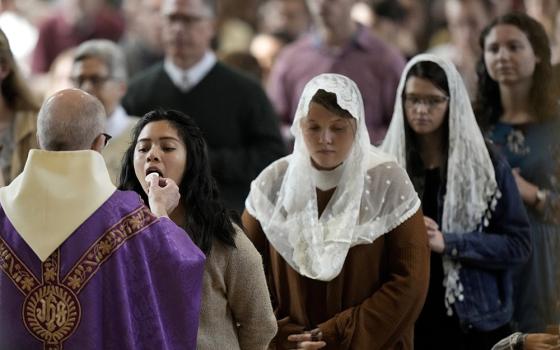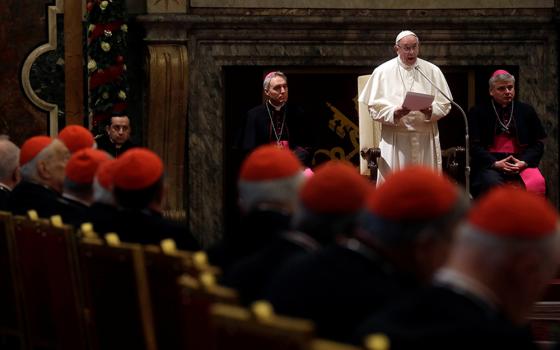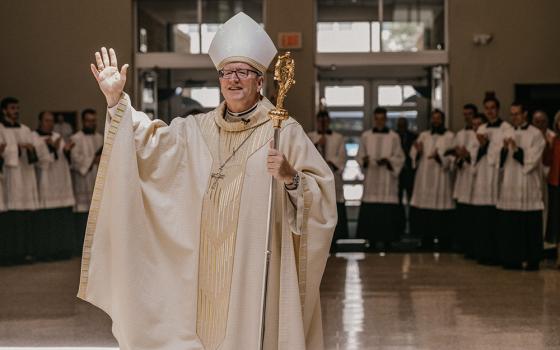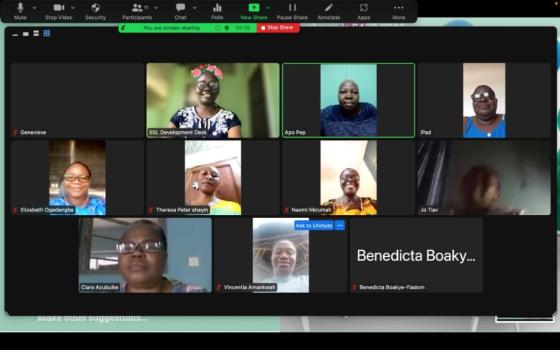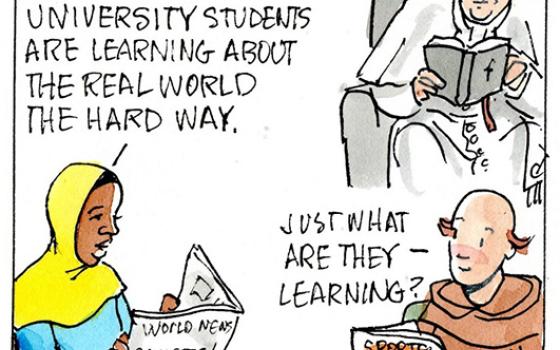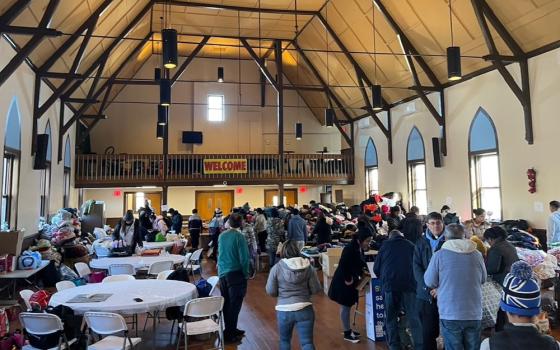
The Heeler family in the Disney+ show "Bluey" includes, clockwise from top left, parents Bandit and Chilli, and daughters Bluey and Bingo. (Courtesy of ©Disney+)
I'll admit it: My wife and I panicked when an extra long "Bluey" episode titled "The Sign" appeared in our Disney+ feed. The titular sign — the one that sat in our cartoon heroes' front yard and read "For Sale" — felt like an existential threat.
Is this the end of Bluey? The series finale we didn't want, don't deserve and can't possibly have enough tissues in the house to cry through? For a kid's show that typically clocks a brisk 7-minute run time, 30 minutes felt indulgent — and foreboding.
April 14, it seemed, would go down as the day joy died on Disney+.
I know my family is not alone in our love for this cartoon about a family of Australian dogs. Created by writer Joe Brumm, the show is deceptively simple: Each episode tells a story about the antics of an anthropomorphized family of blue dogs, the aptly named Heelers. Our protagonist is 6-year-old Bluey, who — along with her 4-year-old sister Bingo, their parents, Bandit and Chilli, and a host of side characters — pulls viewers into a variety of imaginative, heartwarming and hilarious adventures depicting the highs and lows of family life.
But what makes "Bluey" so unique is that it works on multiple levels. Each episode is just as enjoyable to watch for parents as it is for kids — no easy feat to pull off. Any adult who has sat through a few episodes of "Pinkalicious," "Paw Patrol" or "Wishenpoof" knows what I’m talking about.
And so, none of us — not me, not my wife and certainly not my kids — were excited at the prospect that the show might be ending. Like most of the internet, we frantically turned to Google to put our minds at ease.
It was my wife who stumbled upon Sophie Gilbert's aptly named article in The Atlantic, "Is This the End for ‘Bluey’?’" The quick answer was, no — we'd be getting at least one more episode, titled "The Surprise."
But more importantly for me, Gilbert's article introduced spiritual stakes to the conclusion of "Bluey's" third season. "Is Bandit Heeler depressed?" she wondered. It's an odd question to raise about a cartoon character, Gilbert admits, but, as she notes, "the vibes had just been off for the patriarch of 'Bluey.' "
Gilbert was right: Previous episodes had shown a distracted, downtrodden Bandit who had lost some of his usual mojo. One exchange in particular from an episode entitled "Stickbird" came to mind. We find the Heeler family at the beach and the kids frolicking about. But Bandit is distant, troubled, unable to give his family his full attention.
"Let it go, babe," Chilli says. "You’re missing all this."
We never find out what "it" is. But "all this" is clear: We miss the moment at hand, ripe with people and places and joy and possibility, if we allow ourselves to become entangled in a past that is beyond us and a future that is still in motion. The present is where we are called to live.
Why does this matter? Why did it strike me?
In moments of desolation, the antidote is community: turning to those we love and who love us and allowing that love to get us back in touch with the God who loves us even more.
The plot of "The Sign" is based on Bandit’s decision to take a new job in a distant city. He's chasing something, clearly, and while he insists it's the opportunities the better paying job will bring his family, I can't help but wonder if there isn't something deeper at work. Ultimately, Bandit realizes that his family is happy exactly where they are, and in a moment of Herculean effort, he yanks the sign out of the ground and tosses it in the garbage pile.
But that pernicious voice whispering in his ear — What if you had a better job? What if you had more money? What if you just tossed this life aside and started fresh? — is a voice I think we all hear now and again. That's why Gilbert's essay struck me, why her framing was so important. I don't know if Bandit was clinically depressed, but I do believe he was — to use a bedrock term of the Ignatian tradition — in a state of desolation.
Desolation, as Ignatian spiritual director and writer Margaret Silf notes, is a spiritual state in which we turn in on ourselves, wallow in negative feelings and find ourselves cut off from community. We lose energy (Bandit spends the whole "TV Shop" episode looking for vitamins to give him an energy boost) and we lose sight of, and interest in, what's important to us.
As parents, as colleagues, as students, as people, we all find ourselves in desolation from time to time. We find ourselves distracted and lonely, even when surrounded by family and friends. And, consequently, we find ourselves desperate to shake these feelings of listlessness.
What St. Ignatius of Loyola insists, and what Bandit Heeler displays, is that when in such a state, making a rash decision is never the answer. Selling your house and moving to a new city can be the right choice, of course — but it’s not one to make while in desolation.
Why? Because it’s likely not one made in community. Remember: Desolation often turns us inward in a bad way. Throughout "The Sign," we learned that not even Chilli was in favor of the move. We learned that both Bluey and Bingo were happy with the lives they already had. And we learned that Bandit himself was not at all energized by the prospect. Had they even discussed the decision as a family?
"The question of whether the Heelers will leave their city and community is such an affecting one, I think, because it's inextricable from the existential questions of parenting," Gilbert writes. "What does a better life for your family look like? What does money mean in value compared with all the things you can't buy — connections, security, a sense of home? When do parental needs get to override those of kids? There are no answers in the episode."
Advertisement
Ultimately, we make choices and muddle forward. But to make our best choices — for our families, for our communities — we had better first understand ourselves. In moments of desolation, the antidote is community: turning to those we love and who love us and allowing that love to get us back in touch with the God who loves us even more.
I think it's telling that "The Surprise" — the true finale to the season — centers again on Bandit. He has to make another choice, this time,which game to play with which of his daughters. (The choice is all the harder because he'd much rather be watching TV.) But in the end, for Bandit and for us, it's not ultimately about what he chooses but that he grounds himself in the presence of those around him. He shows up. He allows others to reach out and grab him and pull him out of desolation.
"That’s the thing about kids," Bandit remarks. "They'll always surprise you."
Bandit didn't need to leave the life he had for that surprise to show up; it was already right there waiting for him. He just had to allow himself to see it.
I wonder if that's true in our lives, too. I wonder if our God of Surprises is already at work in the mundane moments of our day, urging us on through both signs and surprises. But first we have to turn and look.






